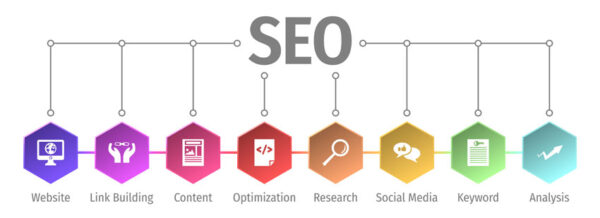In todays marketplace, local businesses need to have a strong online presence to succeed. Local search engine optimisation (SEO) is the key to ensuring that potential customers can find your business when they search for products or services in your area. To effectively boost your local SEO efforts, it’s crucial to understand and implement the core elements of any local SEO project. In this post, we’ll explore these essential components that can make or break your local SEO strategy.

1. Keyword Research and Optimisation:
Conduct thorough keyword research to identify the most relevant and high-traffic keywords for your business. Use tools like Google Keyword Planner, SEMrush, or Ahrefs to discover these keywords. Once identified, strategically incorporate them into your website’s content, meta titles, meta descriptions, and headers. Additionally, consider using geo-specific keywords to target your local audience effectively.
2. Google My Business (GMB) Optimisation:
Your GMB listing, now called Google Business Profile, is often the first thing potential customers see when searching for local businesses. Ensure that all the information provided is accurate and up-to-date. Add high-quality photos, including images of your products or services, interior and exterior shots of your business, and team photos. Regularly post updates and promotions on your GMB profile to keep it active and engaging.
3. On-Page SEO:
In addition to optimising for specific keywords, focus on improving the overall user experience of your website. This includes making sure it loads quickly, is mobile-responsive, and has a clean, user-friendly design. Site structure, navigation, and internal linking are crucial for search engines and users to find content easily.
4. Local Citations:
Consistency in your business NAP (Name, Address, Phone number) across various online directories and platforms is vital. Ensure that all your citations are up-to-date and accurate. Tools like Mos Local and Yext can help you manage your business listings more effectively.
5. Quality Content Creation:
Content is king in the world of SEO. Regularly create informative and valuable content that addresses your audience’s pain points and interests. Localise your content by discussing events, news, and topics relevant to your community. Content marketing not only enhances your SEO but also positions you as an authority in your industry.
6. Link Building:
Building high-quality backlinks from local websites can significantly boost your local SEO efforts. Consider guest posting on local blogs, sponsoring local events, or participating in community activities. Be cautious about the quality of backlinks, as low-quality links can harm your SEO.
7. Local Schema Markup:
Schema markup helps search engines understand the context of your content. Implement local business schema markup on your website to provide structured data, including your business hours, location, and contact information. This can result in rich snippets in search results, increasing your click-through rate.
8. Online Reviews and Reputation Management:
Encourage satisfied customers to leave reviews on your GMB profile and other review sites. Respond to reviews professionally, thanking customers for positive feedback and addressing concerns in a courteous manner. Monitoring your online reputation and addressing negative reviews promptly can demonstrate your commitment to customer satisfaction.
9. Local Link-Building and PR:
Actively seek partnerships with local media outlets, bloggers, and influencers. Engage in local PR efforts to gain media coverage, backlinks, and mentions. A well-crafted local PR strategy can help you establish a strong online presence within your community.
10. Analytics and Monitoring:
Regularly analyse the performance of your local SEO efforts using tools like Google Analytics, Google Search Console, and other SEO software. Track keyword rankings, organic traffic, conversion rates, and user behavior. Use these insights to make data-driven decisions, refine your strategy, and adapt to changes in the search landscape.
By embracing these core elements of local SEO, you can improve your chances of success in the digital sphere. Local SEO is an ongoing process, so be prepared to adapt and refine your strategies as you monitor results and stay current with industry trends and algorithm updates.





